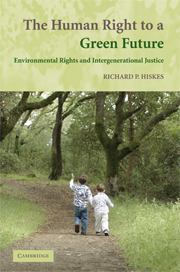Book contents
- Frontmatter
- Contents
- Acknowledgments
- Introduction
- 1 Environmental Human Rights and Intergenerational Justice
- 2 Emergent Human Rights, Identity, Harms, and Duties
- 3 Reflexive Reciprocity and Intergenerational Environmental Justice
- 4 Cosmopolitan Ethics, Communal Reciprocity, and Global Environmentalism
- 5 Toward a Global Consensus on Environmental Human Rights
- 6 Human Rights as Inheritance: Instituting Intergenerational Environmental Justice
- 7 Conclusion: Environmental Justice and the Emergent Future of Human Rights
- References
- Index
2 - Emergent Human Rights, Identity, Harms, and Duties
Published online by Cambridge University Press: 01 July 2009
- Frontmatter
- Contents
- Acknowledgments
- Introduction
- 1 Environmental Human Rights and Intergenerational Justice
- 2 Emergent Human Rights, Identity, Harms, and Duties
- 3 Reflexive Reciprocity and Intergenerational Environmental Justice
- 4 Cosmopolitan Ethics, Communal Reciprocity, and Global Environmentalism
- 5 Toward a Global Consensus on Environmental Human Rights
- 6 Human Rights as Inheritance: Instituting Intergenerational Environmental Justice
- 7 Conclusion: Environmental Justice and the Emergent Future of Human Rights
- References
- Index
Summary
I am not disembodied reason. Nor am I Robinson Crusoe, alone upon his island.
Sir Isaiah Berlin, “Two Concepts of Liberty”With the ratification of the Universal Declaration of Human Rights (UDHR) in 1948, the concept of moral right took on a new modifier: “human.” Since the seventeenth century, moral rights had been designated as “natural” (or inalienable) rights and explicitly distinguished from legal or contractual rights. Natural rights did not rely on governments to enforce the law or contracts, according to Locke, Paine, Jefferson, and others; in fact, natural rights in their view predated governments altogether and could be found even in places without government, the so-called state of nature. Natural rights were taken to be universal in the same way that human rights are conceived of today, as we shall see in a moment, but nevertheless the shift in terminology indicates a changing understanding about rights in general. Mostly, the change from “natural” to “human” rights indicates that our view of rights is open to development and growth. I shall rely on this openness to make the case for environmental human rights, which, I argue in this chapter, should be viewed also as “emergent human rights.”
The conceptual difference between what we now name “human” rights and the earlier “natural” rights can be overstated, but nevertheless it does call attention to an important development in rights theory.
- Type
- Chapter
- Information
- The Human Right to a Green FutureEnvironmental Rights and Intergenerational Justice, pp. 26 - 47Publisher: Cambridge University PressPrint publication year: 2008



